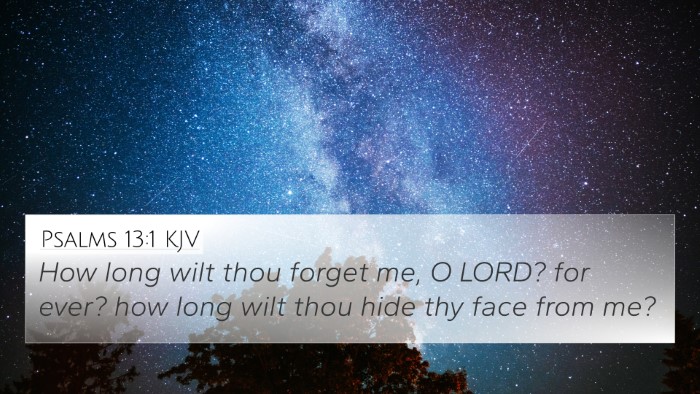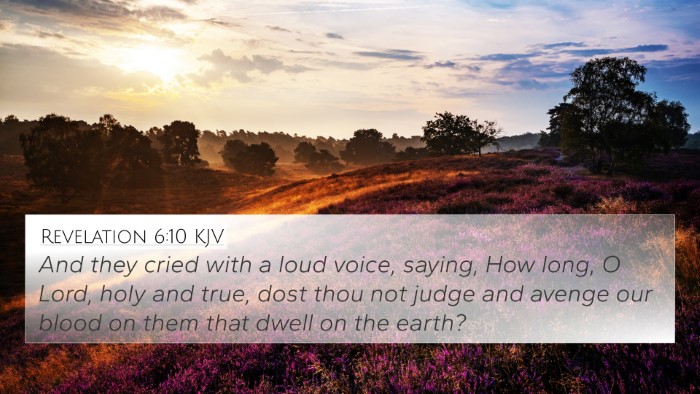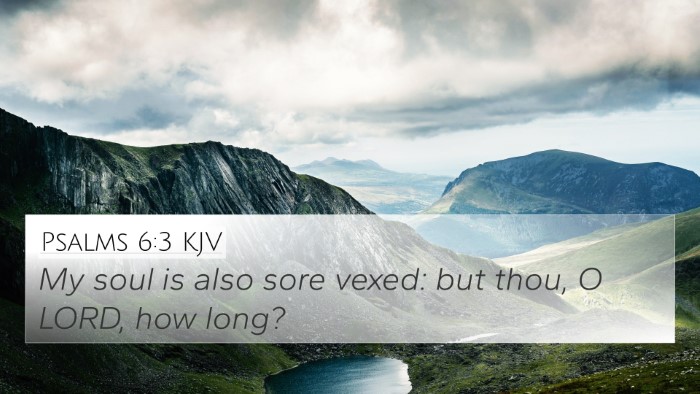Old Testament
Genesis Exodus Leviticus Numbers Deuteronomy Joshua Judges Ruth 1 Samuel 2 Samuel 1 Kings 2 Kings 1 Chronicles 2 Chronicles Ezra Nehemiah Esther Job Psalms Proverbs Ecclesiastes Song of Solomon Isaiah Jeremiah Lamentations Ezekiel Daniel Hosea Joel Amos Obadiah Jonah Micah Nahum Habakkuk Zephaniah Haggai Zechariah MalachiJob 7:19 Similar Verses
Job 7:19 Cross References
How long wilt thou not depart from me, nor let me alone till I swallow down my spittle?
Uncover the Rich Themes and Topics of This Bible Verse
Listed below are the Bible themes associated with Job 7:19. We invite you to explore each theme to gain deeper insights into the Scriptures.
Job 7:19 Cross Reference Verses
This section features a detailed cross-reference designed to enrich your understanding of the Scriptures. Below, you will find carefully selected verses that echo the themes and teachings related to Job 7:19 KJV. Click on any image to explore detailed analyses of related Bible verses and uncover deeper theological insights.

Job 14:6 (KJV) »
Turn from him, that he may rest, till he shall accomplish, as an hireling, his day.

Psalms 13:1 (KJV) »
How long wilt thou forget me, O LORD? for ever? how long wilt thou hide thy face from me?

Revelation 6:10 (KJV) »
And they cried with a loud voice, saying, How long, O Lord, holy and true, dost thou not judge and avenge our blood on them that dwell on the earth?
Job 7:19 Verse Analysis and Similar Verses
Understanding Job 7:19
Job 7:19 reads: "How long will you not look away from me or let me alone till I swallow my spit?" This verse is part of Job's lament, expressing his deep feelings of distress and isolation during his suffering. The verse underlines the intensity of Job's anguish as he grapples with his suffering and longs for solitude from his afflictions.
Insights from Public Domain Commentaries
Matthew Henry's Commentary
Matthew Henry emphasizes the profound despair that Job articulates in this verse. Henry notes that Job feels as if he is being constantly scrutinized and that even the smallest attempts at relief are not acknowledged. This reflects a broader theme of human suffering and the perceived absence of divine compassion during times of trouble.
Albert Barnes' Notes on the Bible
Barnes highlights Job's desire for privacy and finality, as he feels overwhelmed by the trials he is facing. He points out that Job seeks a cessation of troubles, represented in the imagery of swallowing his spit—a metaphor for a basic human need to pause and breathe without external pressure. Barnes also discusses this longing for isolation as a relatable human experience echoed throughout the scriptures.
Adam Clarke's Commentary
Adam Clarke provides an analysis of Job's anguish, interpreting the plea as a cry for relief. Clarke connects this intense emotion to the overall narrative of Job’s suffering, pointing out that his expressions reveal both a physical and spiritual battle. He suggests that Job’s request for solitude is indicative of the deep need for divine presence and understanding during trials.
Thematic Connections
Job 7:19 connects with several other biblical themes and verses, emphasizing the struggle of human suffering and the search for divine attention and respite. Below we highlight some of the key related verses that offer deeper insight into this theme.
- Psalm 38:9 - "Lord, all my desire is before you, and my sighing is not hidden from you."
This verse illustrates a similar feeling of being watched over by God during turmoil.
- Psalm 102:2 - "Do not hide your face from me when I am in distress; turn your ear to me; when I call, answer me quickly."
This verse highlights the desire for divine attention during times of emotional turmoil.
- Proverbs 15:29 - "The Lord is far from the wicked, but he hears the prayer of the righteous."
This emphasizes the hope that God hears our pleas, paralleling Job’s longing for relief and interaction.
- Lamentations 3:34-36 - "To deny a man justice in the presence of the Most High, to deprive a man of his rights before the Most High..."
This reflects the idea of seeking justice and relief from suffering, similar to Job’s cries.
- Matthew 27:46 - "My God, my God, why have you forsaken me?"
An echo of the feeling of abandonment similar to what Job expresses in his lament.
- 1 Peter 5:7 - "Cast all your anxiety on him because he cares for you."
This provides a response to Job’s plea, confirming God’s attentive nature towards human suffering.
- Isaiah 41:10 - "So do not fear, for I am with you; do not be dismayed, for I am your God."
A reassurance of God’s constant companionship, contrasting with Job's sense of isolation.
- James 4:8 - "Draw near to God, and he will draw near to you."
This suggests a two-way relationship that Job longs for amidst his suffering.
Cross-Referencing Biblical Texts
The process of biblical cross-referencing is integral to understanding the depth of texts like Job 7:19. By exploring connections between Bible verses, we can uncover thematic ties that provide richness to our understanding of scripture.
Tools for Bible Cross-Referencing
Utilizing tools such as Bible concordances and cross-reference guides can aid in the exploration of inter-Biblical dialogue. These resources assist believers in identifying connections between Old and New Testament writings, enhancing their study of related themes.
Cross-Referencing Bible Study Methods
Engaging in cross-referencing Bible study methods allows for a comprehensive understanding of scripture. Through thematic connections and comparative analysis, one can see how Job’s feelings of despair resonate within broader biblical narratives.
Conclusion
Job 7:19 serves as a poignant reminder of the human condition, emphasizing a universal quest for divine attention during suffering. Through the insights of public domain commentators and the use of cross-referencing methods, we can uncover deeper meanings and connections that bolster our understanding of biblical texts.





